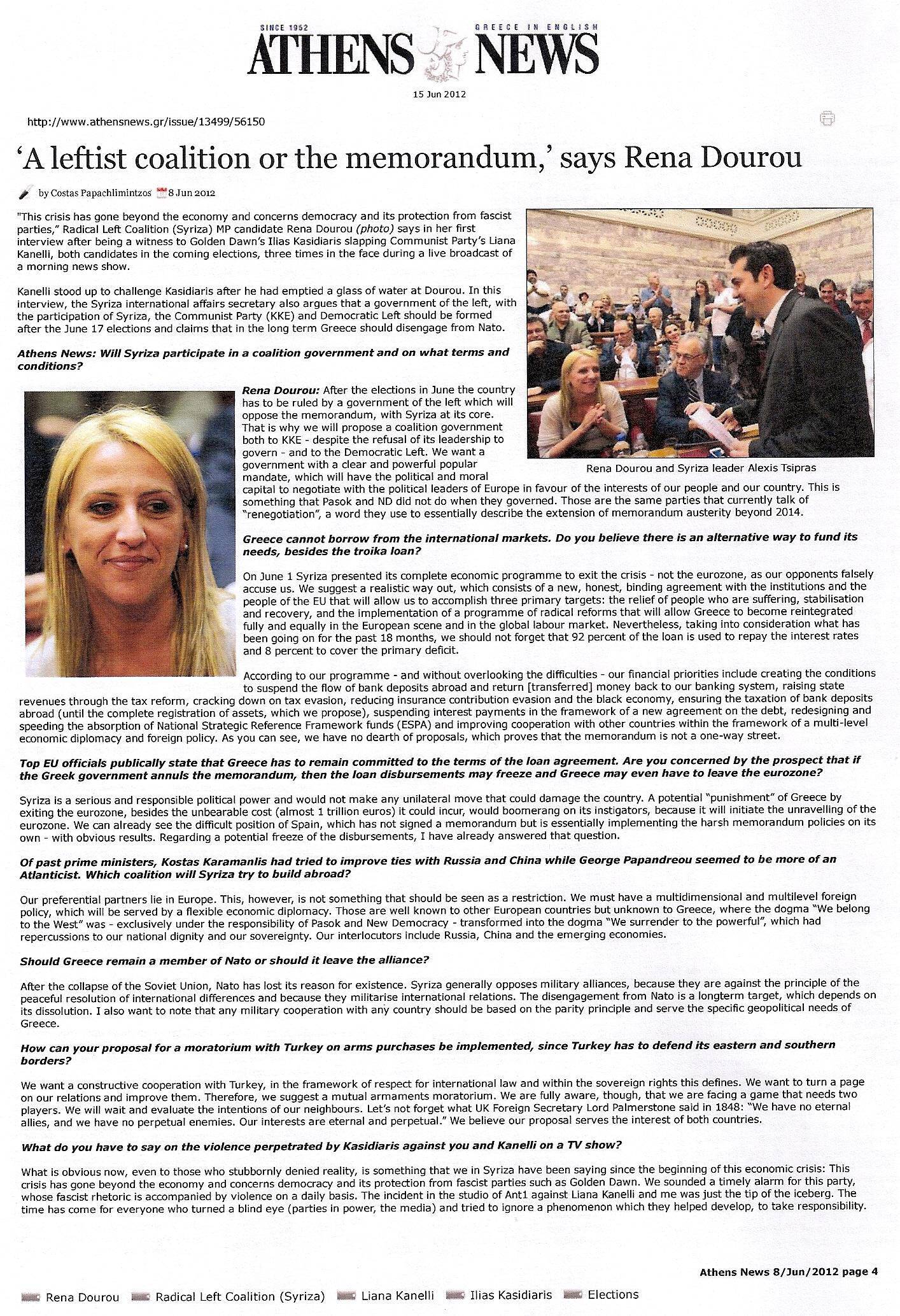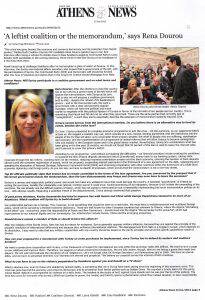Συνέντευξη της Ρένας Δούρου στην εφημερίδα Athens News και τον Κώστα Παπαχλιμίντζο, 8 Ιουνίου2012
‘A leftist coalition or the memorandum,’ says Rena Dourou
“This crisis has gone beyond the economy and concerns democracy and its protection from fascist parties,” Radical Left Coalition (Syriza) MP candidate Rena Dourou (photo) says in her first interview after being a witness to Golden Dawn’s Ilias Kasidiaris slapping Communist Party’s Liana Kanelli, both candidates in the coming elections, three times in the face during a live broadcast of a morning news show.
Kanelli stood up to challenge Kasidiaris after he had emptied a glass of water at Dourou. In this interview, the Syriza international affairs secretary also argues that a government of the left, with the participation of Syriza, the Communist Party (KKE) and Democratic Left should be formed after the June 17 elections and claims that in the long term Greece should disengage from Nato.
Athens News: Will Syriza participate in a coalition government and on what terms and conditions?
Rena Dourou: After the elections in June the country has to be ruled by a government of the left which will oppose the memorandum, with Syriza at its core. That is why we will propose a coalition government both to KKE – despite the refusal of its leadership to govern – and to the Democratic Left. We want a government with a clear and powerful popular mandate, which will have the political and moral capital to negotiate with the political leaders of Europe in favour of the interests of our people and our country. This is something that Pasok and ND did not do when they governed. Those are the same parties that currently talk of “renegotiation”, a word they use to essentially describe the extension of memorandum austerity beyond 2014.
Greece cannot borrow from the international markets. Do you believe there is an alternative way to fund its needs, besides the troika loan?
On June 1 Syriza presented its complete economic programme to exit the crisis – not the eurozone, as our opponents falsely accuse us. We suggest a realistic way out, which consists of a new, honest, binding agreement with the institutions and the people of the EU that will allow us to accomplish three primary targets: the relief of people who are suffering, stabilisation and recovery, and the implementation of a programme of radical reforms that will allow Greece to become reintegrated fully and equally in the European scene and in the global labour market. Nevertheless, taking into consideration what has been going on for the past 18 months, we should not forget that 92 percent of the loan is used to repay the interest rates and 8 percent to cover the primary deficit.
According to our programme – and without overlooking the difficulties – our financial priorities include creating the conditions to suspend the flow of bank deposits abroad and return [transferred] money back to our banking system, raising state revenues through the tax reform, cracking down on tax evasion, reducing insurance contribution evasion and the black economy, ensuring the taxation of bank deposits abroad (until the complete registration of assets, which we propose), suspending interest payments in the framework of a new agreement on the debt, redesigning and speeding the absorption of National Strategic Reference Framework funds (ESPA) and improving cooperation with other countries within the framework of a multi-level economic diplomacy and foreign policy. As you can see, we have no dearth of proposals, which proves that the memorandum is not a one-way street.
Top EU officials publically state that Greece has to remain committed to the terms of the loan agreement. Are you concerned by the prospect that if the Greek government annuls the memorandum, then the loan disbursements may freeze and Greece may even have to leave the eurozone?
Syriza is a serious and responsible political power and would not make any unilateral move that could damage the country. A potential “punishment” of Greece by exiting the eurozone, besides the unbearable cost (almost 1 trillion euros) it could incur, would boomerang on its instigators, because it will initiate the unravelling of the eurozone. We can already see the difficult position of Spain, which has not signed a memorandum but is essentially implementing the harsh memorandum policies on its own – with obvious results. Regarding a potential freeze of the disbursements, I have already answered that question.
Of past prime ministers, Kostas Karamanlis had tried to improve ties with Russia and China while George Papandreou seemed to be more of an Atlanticist. Which coalition will Syriza try to build abroad?
Our preferential partners lie in Europe. This, however, is not something that should be seen as a restriction. We must have a multidimensional and multilevel foreign policy, which will be served by a flexible economic diplomacy. Those are well known to other European countries but unknown to Greece, where the dogma “We belong to the West” was – exclusively under the responsibility of Pasok and New Democracy – transformed into the dogma “We surrender to the powerful”, which had repercussions to our national dignity and our sovereignty. Our interlocutors include Russia, China and the emerging economies.
Should Greece remain a member of Nato or should it leave the alliance?
After the collapse of the Soviet Union, Nato has lost its reason for existence. Syriza generally opposes military alliances, because they are against the principle of the peaceful resolution of international differences and because they militarise international relations. The disengagement from Nato is a longterm target, which depends on its dissolution. I also want to note that any military cooperation with any country should be based on the parity principle and serve the specific geopolitical needs of Greece.
How can your proposal for a moratorium with Turkey on arms purchases be implemented, since Turkey has to defend its eastern and southern borders?
We want a constructive cooperation with Turkey, in the framework of respect for international law and within the sovereign rights this defines. We want to turn a page on our relations and improve them. Therefore, we suggest a mutual armaments moratorium. We are fully aware, though, that we are facing a game that needs two players. We will wait and evaluate the intentions of our neighbours. Let’s not forget what UK Foreign Secretary Lord Palmerstone said in 1848: “We have no eternal allies, and we have no perpetual enemies. Our interests are eternal and perpetual.” We believe our proposal serves the interest of both countries.
What do you have to say on the violence perpetrated by Kasidiaris against you and Kanelli on a TV show?
What is obvious now, even to those who stubbornly denied reality, is something that we in Syriza have been saying since the beginning of this economic crisis: This crisis has gone beyond the economy and concerns democracy and its protection from fascist parties such as Golden Dawn. We sounded a timely alarm for this party, whose fascist rhetoric is accompanied by violence on a daily basis. The incident in the studio of Ant1 against Liana Kanelli and me was just the tip of the iceberg. The time has come for everyone who turned a blind eye (parties in power, the media) and tried to ignore a phenomenon which they helped develop, to take responsibility.











